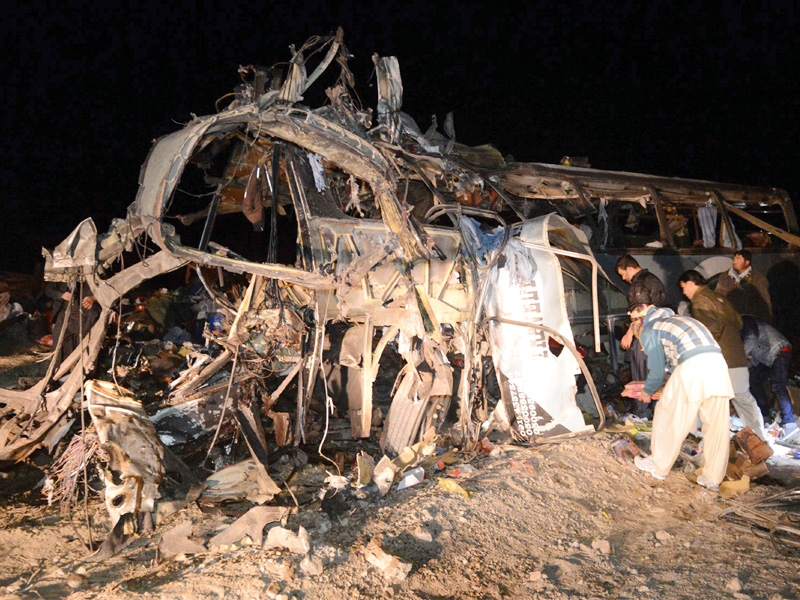
QUETTA: After the Mastung bombing last week left 28 Shia pilgrims dead, the provincial government of Balochistan suspended movement across the 700-kilometre long Quetta-Taftan route.
In view of the security situation, the hundred or so Shia pilgrims returning daily to Pakistan via the Taftan border in the Chagai district from Iran after visiting their sacred places in Iraq, are being flown back.

On Sunday, as many as 215 pilgrims stranded in Dalbandin in the Chagai district flew to Quetta in two C-130 aircraft, in the third flight transporting Shia pilgrims to their homes in the last week.
“All the stranded pilgrims were provided with food, water and other necessities in Dalbandin,” said the home secretary of Balochistan.
“They will be taken to Dalbandin under tight security,” said Razzaq Sasoli, assistant commissioner Dalbandin.
Balochistan’s Chief Minister Dr Malik announced that there will be a ferry service for pilgrims, but so far, nothing has been finalised as Shia leaders feel it is not a permanent solution to the killings.
Acting president of the Balochistan Shia Conference, Mussarat Agha says ferry services and C-130 planes for pilgrims are not a permanent solution to sectarian violence. “We usually have to remind the government that it should fulfill its constitutional obligation by protecting the life and property of people,” he told The Express Tribune.
Agha said law enforcement agencies should launch an operation against criminals as the suspension of the Taftan route demonstrates a failure of the writ of law. “Today, we are not being allowed to use the Taftan-Quetta highway. Who knows, another day we will be asked not to use any highway,” he said.
Zero Point in Taftan, the name of the Pak-Iran border, is the only legal route to get into Iran from Balochistan and proceed towards Iraq.
“There is immigration at the Taftan border while other routes on the coastal belt like Jewani are illegal,” said Sasoli, who has previously served at the Taftan border as a Tehsildar.
Shia pilgrims, majority of who belong to the Hazara community, in Quetta leave daily to visit their holy sites in Iran and Iraq. In Quetta valley, the Hazara community lives in two compartments; on Alamdar Road, northeast, and Hazara Town, southwest, of the city.
Shia pilgrims are targeted more often in Mastung and Quetta. No attacks have taken in the Chagai and Naushki districts from where pilgrims travel on the highway to get Quetta. The attacks are concentrated in Mastung and Quetta.
“I cannot rule out the possibility of attacks in Chagai and Naushki in the future, but we have never seen sectarian violence in these districts,” Sasoli said.
With his knowledge about the politics and geography of Balochistan, Sasoli feels it would be better if there were more legal routes from the coastal areas of the province which share a long border with Iran.
A survivor from the Mastung attack last Tuesday explained why Shia pilgrims use this route despite the frequent incidents of sectarian violence.
Ali Hassan, 34, who survived the attack along with his three-year-old daughter and mother, has said there is no direct flight to Iran and Iraq from Quetta, which is why community members travel on buses for pilgrimage.
“There used to be flights for Mashhad and Zaidan from Quetta but now there are none. Taftan is the only legal route to get to Iran and move forward to Iraq,” he said. There are other infrequent routes from coastal areas and Panjgur, but pilgrims do not use these routes for security concerns.
According to Ali, buses leave for Iran and Iraq on a daily basis, as passengers get on board from Alamdar Road and Hazara Town. The number of passengers and buses increases during Muharram.
After the surge in sectarian violence near Mastung and Quetta in 2011 and 2012, security for pilgrim buses was beefed up with the deployment of the FC and Balochistan Levies.
Published in The Express Tribune, January 27th, 2014.
COMMENTS (1)
Comments are moderated and generally will be posted if they are on-topic and not abusive.
For more information, please see our Comments FAQ


















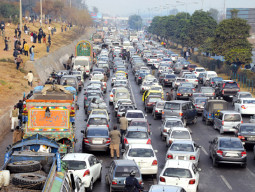
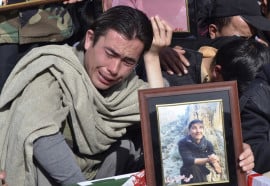
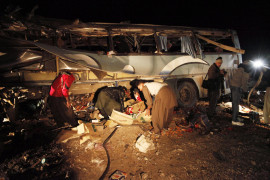


1711457205-0/US-Baltimore-Bridge-Collapse-(1)1711457205-0-270x192.webp)
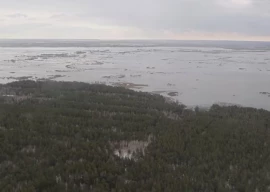










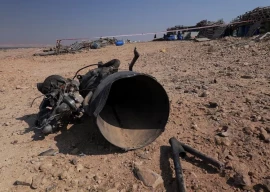






Stop Shia and Hazara genocide in Pakistan. Please.